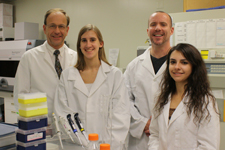Doors Open for Scranton’s Class of 2011 Goldwater Scholars

In the rarefied world of university scholarship there are three kinds of students: smart, really smart and Goldwater scholars. Maria Gubbiotti and Melissa Wasilewski are Goldwater scholars, the premier undergraduate scholarship program for students studying mathematics, natural sciences and engineering. Both are local students and are members of The University of Scranton’s Class of 2011. Their transcripts consist of virtually unblemished strings of A's and whose resumes brim with honors, awards and esoteric scientific research with implications for neurodegenerative diseases and drug-resistant bacterial infections.
Despite the sophisticated research, the As, the honor societies and even a full-tuition Presidential Scholarship to Scranton, Gubbiotti says, pre-Goldwater, she was one of many gifted students desiring entrance to an M.D./Ph.D. program.
“Everyone (who applies) has a ridiculous GPA. Everyone has a ridiculous MCAT score. Everyone’s done research,” she says. Then, in the spring of her junior year, she won the Goldwater and her M.D./Ph.D. application jumped to the head of the pack. “It definitely opened doors,” she says. “I was extremely excited to get it, to be recognized nationally.”
The national attention is also what Wasilewski cites as a big benefit of the Goldwater. Pre-Goldwater, Wasilewski was both an impressive student and an impressive scientist who had already snagged coveted summer research at Cornell University. Despite these accomplishments, there was still a feeling of insularity about her work. Her success seemed confined to specific communities. Winning the Goldwater scholarship changed that. The committee reviewing Wasilewski’s application also considered the achievements of amazing students from institutions nationwide -- from Harvard to Stanford.
The Goldwater committee “wanted to see that you recognized a problem in the scientific community and that you thought you knew how to help,” Wasilewski says. “Winning the scholarship meant that the people reading the application thought the work was important and believed that I could do it. It gave me the confidence that I was on the right track.”
The problem Wasilewski was studying at the time of her application was a problem affecting diagnosis of bacterial infections in patients with cystic fibrosis. She assisted Scranton Biology Professor, Michael Sulzinski, Ph.D., in developing a method to quickly identify the bacteria causing the infection, rather than going through the time-consuming process of elimination. This will enable speedier administration of the correct antibiotic. She continued studying antibiotic resistance as an undergraduate research fellow at Princeton University, helping identify genes involved in bacterial antibiotic resistance mechanisms.
Work with Dr. Sulzinski and winning the Goldwater made Wasilewski realize that she wants to focus on the “molecular basis of disease . . . DNA, proteins.” What this means is the blend of laboratory research and direct clinical work that is called academic medicine. Local patients seek academic medicine when they travel outside the area for the newest treatments or for treatment of unusual diseases. To prepare for a career in academic medicine, Wasilewski has been accepted into several highly competitive M.D./Ph.D programs and has chosen to attend Temple University School of Medicine in Philadelphia.
Gubbiotti’s Goldwater-winning research took place in the lab of Scranton Chemistry Professor, Tim Foley, Ph.D. It is research she continues and involves “isolating and identifying proteins that can be targets for cell signaling.” This work, she says, provides a better understanding of normal brain functioning and may open windows to understanding abnormal functions. This could mean breakthroughs in the treatment of neurodegenerative diseases.
Gubbiotti, who has nurtured a passion for scientific research since she was a high school student taking part in The University of Scranton’s “Brain Bee,” envisions herself in a pure research role, perhaps running a lab and teaching at a large university or medical school. She has been accepted to several outstanding M.D./Ph.D. Programs, including the University of Connecticut and Boston University, and will attend Thomas Jefferson University in Philadelphia.
In four short years, Gubbiotti and Wasilewski have participated in world-class research that asks questions of profound importance to human health. The Scranton labs of Dr. Sulzinski and Dr. Foley provided the environment for this academic questioning, pursuits deemed worthy of a scholarship bestowed on a only a few hundred students each year. As Gubbiotti says, “Dr. Foley does a fantastic job. Scranton is a small institution and we compete against candidates from much bigger institutions who write papers for Science and Nature. It's a very high honor.”






